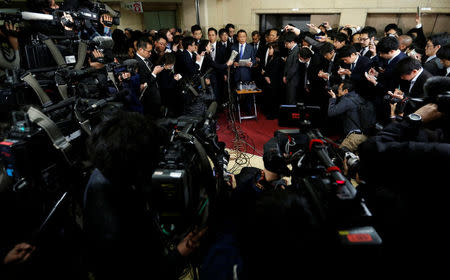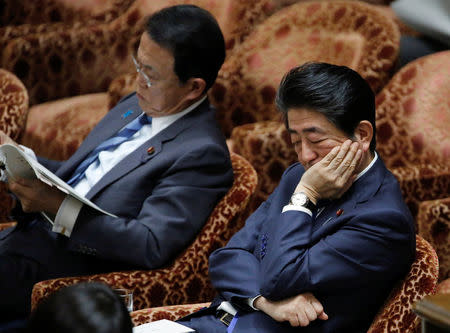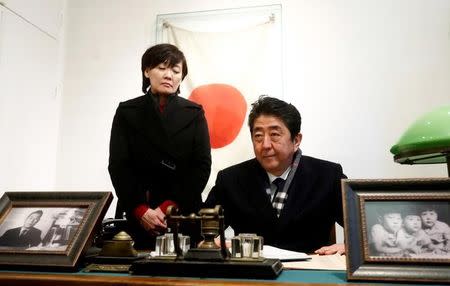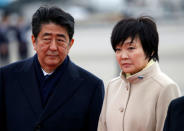Japan PM, finance minister under fire over suspected cover-up of cronyism
By Stanley White and Tetsushi Kajimoto
TOKYO (Reuters) - Japanese Prime Minister Shinzo Abe and his close ally, Finance Minister Taro Aso, faced growing pressure on Monday over a suspected cover-up of a cronyism scandal that has dogged the premier for more than a year.
Copies of documents seen by Reuters showed that references to Abe, his wife and Aso were removed from finance ministry records of the discounted sale of state-owned land to a school operator with ties to Abe's wife, Akie.
Abe, now in his sixth year in office, has denied that he or his wife did favours for the school operator, Moritomo Gakuen, and has said he would resign if evidence was found that they had.
Excised references seen by Reuters did not appear to show that Abe or his wife intervened directly in the deal.
Suspicion of a cover-up could slash Abe's ratings and dash his hopes for a third term as leader of his Liberal Democratic Party (LDP). Victory in the LDP September leadership vote would put him on track to become Japan's longest-serving premier.
The doubts are also putting pressure on Aso to resign.
"It could shake confidence in the administration as a whole. I strongly feel responsibility as the head of administration," Abe told reporters after the finance ministry reported on the altered documents.
"I apologise to all of the people."
Abe said he wanted Aso to make every effort to clarify all the facts and ensure such things do not happen again.
Aso told a separate news conference that several officials at his ministry's division in charge of the sale were involved in altering the documents to make them conform with testimony in parliament by the then-head of the division.
"It has become clear that there was a cover-up and falsification," opposition Democratic Party leader Yuichiro Tamaki told reporters. He said Aso should resign and parliament hold hearings on the matter.
The 77-year-old Aso, who is also deputy premier and whose backing is vital for Abe, apologised for his ministry's actions, but said that he had no intention of stepping down.
The risk for Aso and Abe, experts said, is that the suspected cover-up does more damage than the land sale itself.
"The cover-up is now a bigger issue than the original incident," said Koichi Nakano, a professor at Sophia University.
A finance ministry official said that 14 items had been altered in the documents after February last year - when the scandal broke - at the instruction of the ministry's financial division to match testimony in parliament.
ASO'S SURVIVAL?
One such reference was to Akie's visit to the school at the heart of the suspected scandal. Also removed was a reference to ties by Abe and Aso to a conservative lobby group, Nippon Kaigi.
The records include a comment from Yasunori Kagoike, the former head of Moritomo Gakuen, citing Akie Abe as telling him: "This is good land so please proceed."
A kindergarten run by Moritomo Gakuen taught a nationalist curriculum in line with views espoused by Nippon Kaigi.
"At the very least, it seems that Aso's chances of surviving as finance minister are diminishing rapidly," wrote Tobias Harris, vice president of consultancy Teneo Intelligence, in an email. He said there was no "smoking gun" showing direct intervention by Abe or his wife.
But Harris added: "It now seems to be more a question of whether Abe can manage an orderly exit at the end of his term in September or whether he'll resign hastily again - but I don't see how he can win a new mandate amidst the Abe fatigue that will surely grow after these revelations."
A Sankei newspaper poll over the weekend said 71 percent of respondents said Aso should go.
On Friday, National Tax Agency chief Nobuhisa Sagawa resigned over remarks in parliament last year about the case.
Sagawa headed the ministry division that submitted the documents before he was tapped as tax agency chief in July, an appointment critics saw as a reward for his efforts to diffuse the issue with his statements to parliament last year.
Some LDP members said politicians should not pass the buck to bureaucrats.
"It is inconceivable that the bureaucrats on the spot had such authority (to alter the documents)," media quoted Shigeru Ishiba, an LDP lawmaker who has made no secret of his desire to challenge Abe in the party race, as saying on the weekend.
Abe, 63, swept back to power in December 2012 promising to revive the economy and bolster Japan's defence. It was a rare comeback for the conservative lawmaker, who quit abruptly in 2007 after a year in office marked by scandals in his cabinet, a deadlocked parliament and ill health.
His ruling bloc won a two-thirds "super majority" in an October lower house poll, helped by opposition disarray.
A March 9-11 survey by the Yomiuri newspaper showed support for Abe's cabinet has now fallen to 48 percent, down six points from a month earlier. Non-support rose to 42 percent and 80 percent said that the matter had not been handled appropriately.
(Writing by Linda Sieg; Additional reporting by Takaya Yamaguchi, Kaori Kaneko, Ami Miyazaki, Yoshifumi Takemoto and Nobuhiro Kubo, Elaine Lies and Malcolm Foster; Editing by Michael Perry, Robert Birsel)












